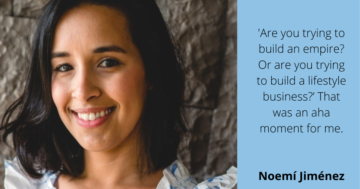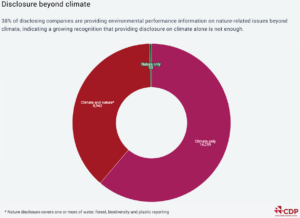In mid-May, we published the 2021 edition of the annual GreenBiz 30 Under 30 list, and I hope you’ve taken some time to meet them collectively, if not individually.
This is the sixth cohort of rising young sustainability professionals that we’ve identified and highlighted since 2016. So what’s going on for some past honorees? Rather than canvassing them for career updates and publishing a bulk update, this year, we emailed the alumni and asked them to reflect on how the pandemic has reshaped their focus on the “social” elements of sustainability — the ones focused on nurturing human well-being. We asked them to consider this question: What changes have you and your team made in the past year to embrace the S in ESG?
Following are the responses I’ve received as of late July. They are presented alphabetically by last name. The roles cited for each individual are not necessarily the ones they held when they were originally named to the list. The comments are solely the opinions of the individual GreenBiz 30 Under 30 alumni, not necessarily those of their current employer.

Holly Beale (Class of 2019)
Senior Project Manager, Community Environmental Sustainability, Datacenter Community Development; Microsoft
Contributing to a more just and sustainable world is a moral imperative that transcends politics, organizational structures and the artificial boundaries we’ve constructed — such as environmental issues (climate change, deforestation, food systems, etc.) to types of environments (“human” vs. “natural”). Like a neural network or tropical ecosystem, these issues are so intersectional, the strands could never be pulled apart.
So for companies that have the opportunity for impact, we also have the obligation to try to understand the intersectionality of environmental, social and governance, and structure programs with principles that ensure comprehensive aspects of E, S and G. Over the past year, I have focused on using the organizational weight of Microsoft to strive for a more equitable society and put us squarely in the movement with equity work.
I’ve incorporated new tools that integrate environmental, human health and equity factors into the programs. My team is piloting a structure that ensures projects provide benefits to priority populations, such as under-resourced and marginalized populations. These efforts have gone outside of the “environmental sustainability” focus to contribute to the overall mission; to ensure the appropriate business models, value propositions, messaging, support structure and readiness to reach beyond traditional boundaries for truly intersectional programs.

Chris Castro (Class of 2016)
Director, Office of Sustainability and Resilience, City of Orlando, Florida
There has been a lot going on the last year on the S component of ESG in Orlando.
First, our city moved forward with hiring its first chief equity official, Merchon Green, who is working to institutionalize equitable government policies and practices to ensure we are supporting the most vulnerable.
The Office of Sustainability & Resilience (Green Works Orlando) immediately began to fill a void when the pandemic hit by facilitating a “local food recovery network” of fresh produce, fruits and vegetables to deliver those resources to community-based organizations and direct to families in need. To date [mid-June], we have arranged facilities of over 20 tons of food by leveraging community garden plots, urban farm gleaning, hydroponic farms and more. The city at large has done tremendous programs that are documented here: http://orlando.gov/equity.

Lisa Curtis (Class of 2016)
Founder and CEO, Kuli Kuli
If the last year has taught us anything, it’s that businesses of all shapes and sizes are grappling with new challenges in addressing issues around justice, equity, diversity and Inclusion (JEDI).
While many companies scrambled to figure out their JEDI strategy in June 2020, Kuli Kuli was well into building a culture of diversity and inclusion with its staff and supplier partners.
As a company dedicated to unlocking market access for farmers growing indigenous, climate-smart crops, one of our core values is that when farmers thrive, Kuli Kuli thrives. Even with the pandemic’s colossal supply chain shocks, we have remained dedicated to sourcing directly from small farmers, prioritizing African and women-led social enterprises.
Sadly, the loss of new retail sales opportunities in 2020 left us with an oversupply of moringa that meant we were unable to sustain our usual levels of purchasing. To continue supporting our supplier communities, we established flexible repayment plans, forgave nearly $400,000 in outstanding purchase orders, referred our suppliers to grants and investors and even made purchases of moringa just to keep certain suppliers afloat. We also collaborated with our farmer partners to hold webinars and marketing campaigns to promote their businesses and donate to their impact initiatives. Thankfully, we are back to ordering again and are grateful that our most impactful partners have survived this tumultuous year.
Internally, the Kuli Kuli team has remained focused on building an inclusive and positive working environment for all. One initiative that inspired change was the creation of an employee media club to discuss films and books on topics around racism, colonialism, modern slavery and more. These conversations compelled us to review our external communications to ensure we were using our platform to dispel stereotypes, advocate for justice and promote the voices of people of color. Kuli Kuli’s communication pillars and ethics guidelines were re-engineered to reflect how the company will continue to stand up for what we believe in.

Janelle Heslop (Class of 2016)
Senior Manager, Strategic Planning and Operations; Amgen
At Amgen, our mission is to serve patients, and that goes beyond making vital, life-saving medicines. As a leader in biotechnology, we have been focused on diversity and inclusion and healthcare disparities for many years, but the events of 2020 (concerns around health and wellness, social inequality, etc.) caused us to accelerate and elevate our actions.
For example, in 2020, the Amgen Black Employee Network (ABEN) — an employee resource group in which I am an active member — launched an initiative to increase diversity of clinical trials through diversifying investigators and clinical trial sites and working with community nonprofits to help remove barriers to participation in clinical trials. Further, Amgen also became a founding member of OneTen, a coalition to hire 1 million Black Americans over 10 years.
Lastly, Amgen recently announced its commitment to become carbon neutral by 2027, which will have both positive environmental and social impacts in our communities. It’s an exciting time to be at Amgen, and I’m so proud to be part of the journey.

Danielle Joseph (Class of 2018)
Executive Director, Closed Loop Partners
2020 was a trying year for the world in the face of the spread of the novel coronavirus, our shared losses, systemic racism and the disproportionate impact coronavirus has had on disadvantaged communities both globally and at home.
Many organizations that are essential to cycling valuable limited natural resources in our communities were put on pause and faced financial constraints. Amidst these challenges, Closed Loop Partners provided funding to the DSNY COVID-19 Emergency Fund through the Closed Loop Foundation, and supported three GrowNYC compost drop-off sites in New York City, bridging funding gaps left by recent City budget cuts caused by COVID-19.
In 2020, we also looked within our organization, conducting an internal audit of our diversity, equity and inclusion practices and processes — within hiring, investing and our day-to-day conduct. We joined Confluence Philanthropy’s Racial Equity Pledge to move our agenda forward on racial equity — working to help transform the practice of investing by aligning capital with sustainability, equity and justice. Additionally, we joined the Leadership Now Project, recognizing the responsibility of businesses to mobilize on issues of economic, social and racial justice in innovative and evidence-based ways. We still have a lot of work to do, but are committed to building toward an equitable future for all.
Within Closed Loop Partners’ network, we doubled down on supporting companies working to solve major bottlenecks across global supply chains, in order to support the people on the receiving end and build a more resilient, just and waste-free world.
Across all of Closed Loop Partners’ verticals, we continue to push forward the circular economy in a way that is accessible, creates high-quality jobs and allows cities and industries to thrive by maximizing the value of existing materials. The push of 2020 was towards remembering that humans and local ecosystems are highly interconnected.

Ding Li (Class of 2018)
Senior Strategy Consultant, Longevity Partners
I am proud to work with some of the world’s largest real estate investors to improve their social performance across Europe. In the past year, our team received enormous client requests on health and well-being, social value and B-Corp certification. Enhancing social performance is so demanded that we created two new business units: Social Value, and Health and Wellbeing.
As a company, we ensure our employees are physically and mentally well. Since the start of COVID-19, our company size has more than doubled. Physically meeting with new colleagues is challenging. We thus started having virtual team building events, including a “baby pic” quiz, virtual drinks and WFH Life Instagram series. We also encourage each employee to take one hour of sports.
In preparing our colleagues’ safe return to work, we will provide hand sanitizers at every table and an automatic thermometer taking each employee’s temperature before entering the premises. Yoga sessions will be organized during lunch. We believe these measures will contribute to the health and well-being of employees.
This summer, we also started the Longevity Partners social committee and B-Corp application. We try our best to take care of our employees, so they can take care of our clients.

Kavickumar Muruganathan (Class of 2017)
APAC Lead, Supply Chain Sustainability Compliance; Neste
The COVID-19 crisis seems to have become a watershed moment for the S in ESG, having put a spotlight on the weak points of our societies when it comes to health and wider social inequality.
Some pain points that have come to the forefront are evolving societal expectations associated with the growing inequality between wealth and poverty; access to affordable housing; connection to nature; gender and diversity gap; and increase in mental illness.
ESG is a journey, not a destination. The integration of ESG factors into decision-making and management is a dynamic process; the market is constantly evolving so the goalposts are always changing. We no longer use social metrics merely as a negative screening tool when evaluating.
The social element may be more difficult to define and quantify, but it can make a big difference to trust, confidence, inclusion and effective stakeholder engagement. We need to rethink how we can collectively help address societal problems around poverty, inequality and mental health.

Anthony Santarelli (Class of 2017)
Director, Illinois Green Business Association
Over the past year, my team at the Smart Energy Design Assistance Center formed a Smart Energy Equity (SEE) working group to improve our internal performance and external impact in regard to diversity and inclusion. We chose SEE to reflect how we are starting by looking inward to increase our consciousness and recognize our biases before working outward.
Our eventual goal is dismantling the racial and gender disparities in the energy industry. But the barriers supporting the status quo are formidable. Our work with community stakeholders and energy professionals around workforce development helps us study the impacts of these historical and current injustices. The Midwest especially struggles with representation across the energy sector (including the clean energy transition) and needs to evolve.
From systemic issues inherent in the larger energy workforce ecosystem to red tape bureaucracy that fails to understand or meet the needs of a diverse workforce, we have a long way to go. The energy industry is transitioning while bracing for an exodus of an aging workforce ready to retire and seemingly no one to take the reins. This problem could be an opportunity for Black, Indigenous and people of color (BIPOC) and underrepresented communities to get their piece of the clean energy pie.

Tai Ullman (Class of 2016)
Sustainability Manager, Global Edible Oil Solutions; Cargill
We have made several changes in the past year to better incorporate the S in ESG. In our work, we have been exploring ways to reach BIPOC farmers. For example, we recently launched a partnership with the National Black Growers Council and 100 Ranchers called the Black Farmer Equity Initiative. This is focused on improving market access and financial inclusion, adopting sustainable agricultural practices, supporting next-generation agriculture leaders and advocating for policies that advance equity in agriculture.
We are also working on changing our culture. In our team, we start meetings by sharing diversity, equity and inclusion moments, as well as undertaking racial equity challenges during Black History Month and Asian Heritage Month.
GreenBiz welcomes articles and essays submitted by former 30 Under 30 cohorts and well as other sustainability professionals, provided they meet our editorial guidelines. If you’d like to submit a draft for consideration, please contact GreenBiz Editorial Director Heather Clancy.
Source: https://www.greenbiz.com/article/rising-sustainability-leaders-how-we-embrace-s-esg









